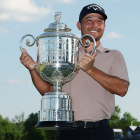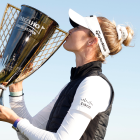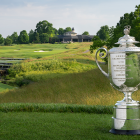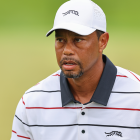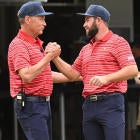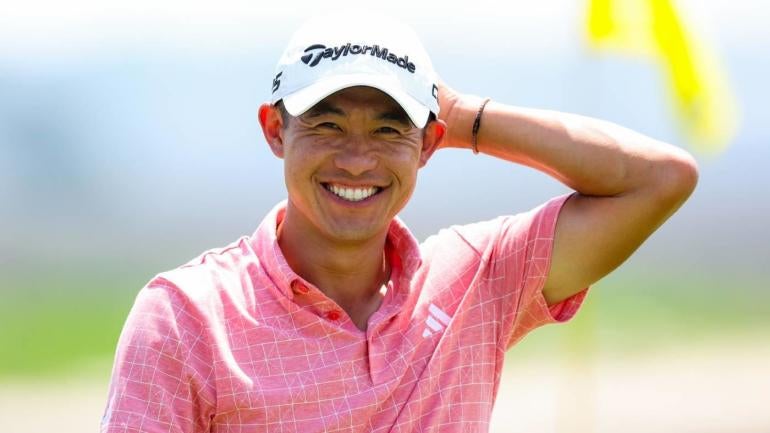
CHARLOTTE, N.C. -- Collin Morikawa stood on the ninth tee box last month at Augusta National tied for the lead at the 2024 Masters. He was 10 holes away from slipping on the green jacket, what would have marked his third different major championship claimed across 17 such appearances.
While some were surprised about Morikawa's presence on the leaderboard -- given his lackluster form to begin the year -- he was not. Still, Morikawa didn't win his first Masters, grab the third leg of the career grand slam or vanquish the beast that is Scottie Scheffler. But that doesn't mean the year's first major championship was a failure.
The two-time major champion reminded the general golfing public in April that he may not need his best for his name to be penned on a short list four times a year.
Ahead of the Wells Fargo Championship and next week's PGA Championship, CBS Sports caught up with Morikawa to discuss the start to major championship season, the internal trade-off between satisfaction and disappointment, his swing coach carousel and what it will take to chase down the world No. 1.
What were the 24 hours after the Masters like? Those immediate emotions.
Collin Morikawa: "There was a little frustration, [a little] motivation. Obviously, I was frustrated because I had two holes that costed me at least staying in contention, and who knows how the end of the round could have turned out, but those two holes really sucked. It sucked because, when I have been in that position before in the majors, I haven't done that.
"I think it's just been over the past two years of trying to find my swing and find that shot again, find that fade. But I was motivated because it was also nice stepping stone for me knowing that it's -- I know it's still there. I know I can still win out there easily. I just got to put the pieces together. Right now, Scottie obviously has all the pieces, so I've got to start putting them all together if I want to contend more often."
With a player of your caliber, I am always interested in the internal trade-off between the satisfaction of contending in a major championship versus the disappointment of coming up short.
Morikawa: "It's a balance -- you have to really assess where your game is at. If I felt like I played the best I ever could and that's what I produced, then I've got some issues. But I felt like I left a lot of shots out there throughout the week. That's what's great. I know you want to be winning with your B- and C-game, let's call it, but you also want to know that, when your A-game is on, that you're winning as well. We weren't quite there yet, but obviously we're trending in the right direction to hopefully put together four good rounds in these next few months."
You've been able to show up at majors without your best stuff -- the 2022 U.S. Open, this year's Masters -- and find something. What do you credit that to?
Morikawa: "At the end of the day, playing in majors is about feeling comfortable, knowing how to play and just understanding what they represent. Thankfully, I've been able to knock off at least that first one because, all the best players that don't win one, they get that question for years on end -- well, I guess at least four times a year, and that's not something you want to keep listening to.
"So, for me, knowing that I have done it in the past and loving that stage where the best players are going to be and what they mean and the history behind them, sometimes it gets you focused in a little bit more. You wish you had that every week, but sometimes it just takes that setting to put you there."
You joined forces with Mark Blackburn as your swing coach there for a bit, went solo and am now back with Rick Sessinghaus. What have you learned about yourself during this time?
Morikawa: "I've learned a lot. Ever since I've turned pro, I've learned a lot about just golf in general and the golf swing. I think for me, knowing what I had in the past, it's plenty good. I know I can use that swing and win with it. The problem was that I felt like I lost that swing, so I had to search for something new and search for new things. I learned a lot with Mark, but I kind of got to a point where I wanted to go back to the old and put the pieces together -- use the new and the old -- and just know that my golf swing is still there. I just got to remember those little feels. Sometimes it takes a break like that, and it's fine."
Why did you and Rick split in the first place?
Morikawa: "I think we split because I was frustrated with everything we were trying wasn't working, so I thought I had to go down a new way, and I worked for a few events here and there with Mark, and I learned a lot. But then I realized it wasn't the way I wanted to go about that. Coaches all coach very differently. They might know a lot and they might not know a lot, but it's how they deliver it. And it just got to a point where it wasn't working for me, and I went back to old instead of searching for something new.
We've heard top players like Viktor Hovland talk about squeezing everything out of their game and leaving no stone unturned and then someone like Xander Schauffele who admitted he was a little scared to make changes because it could backfire and prove to not be beneficial. I'm wondering where you fall on this spectrum?
Morikawa: "I think I've done it all. I think, with Mark, I was definitely searching -- that Viktor route. I'm kind of back where there's a lot of knowledge up there, and I just got to use it wisely. And that's where Rick comes in where he's making sure we're focused on the right things and making sure, by Thursday, I know what I am trying to do. There's no good player out there that's a mechanical player that's going to play well consistently just thinking about their swing and exactly the position. When I came out and turned pro, there weren't many thoughts. I just came out, hit the shots and found it. Ignorance is bliss, and I'm just trying to get back to that state."
Seems like everyone is chasing their own version of perfection, which may very well be Scottie Scheffler at the moment. You've competed with him down the stretch a couple times this last month. How much pressure does his game put on his opponents?
Morikawa: "It's motivating me to figure this out quicker and just get to it. You can't be slacking around him -- not that you ever could -- but for someone that is playing so well and is continuing to do that, you just know every shot is where he wants it to be. That's what I'm trying to get to -- the goods ones are obviously going to be good, but it's how do we dial in those bad missed shots. For him, he doesn't miss many shots, but when he does, it's in the right spot. It's close enough, and that's what you do when you're playing well, and he's obviously playing pretty well."
What do you have to do to chase him down?
Morikawa: "I got to hit my shots better. I got to hit my cuts, and I got to miss it in the right spots. What he is doing with his irons is obviously incredible, but I feel like that I've been at points in my career so far where I have hit my irons like that and I just got to get back to doing that. And I know can, and I know we're pretty close."














